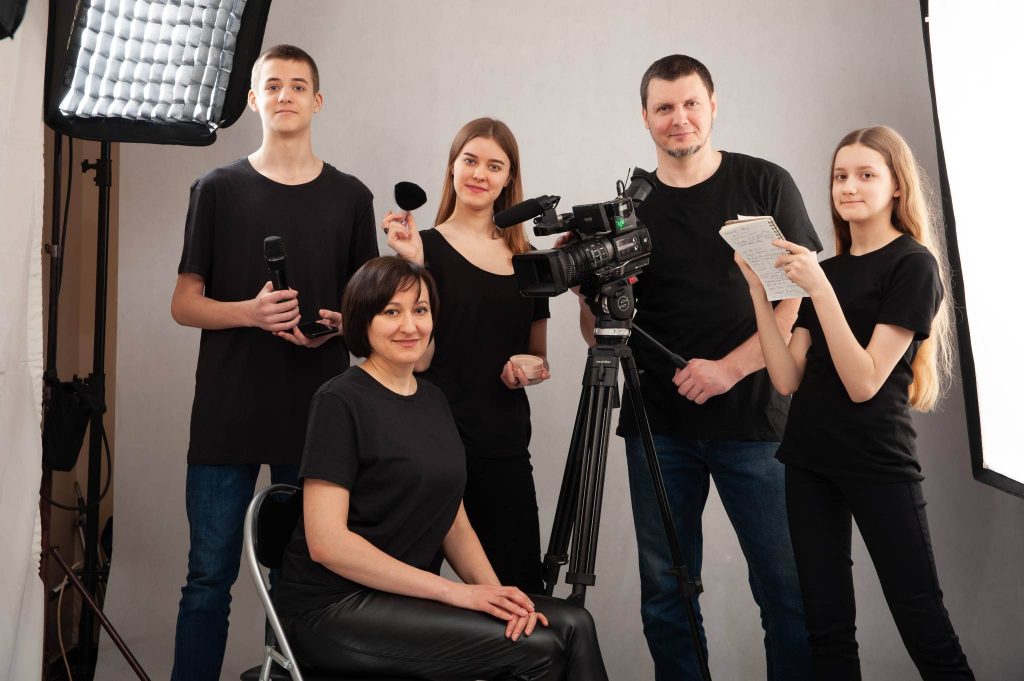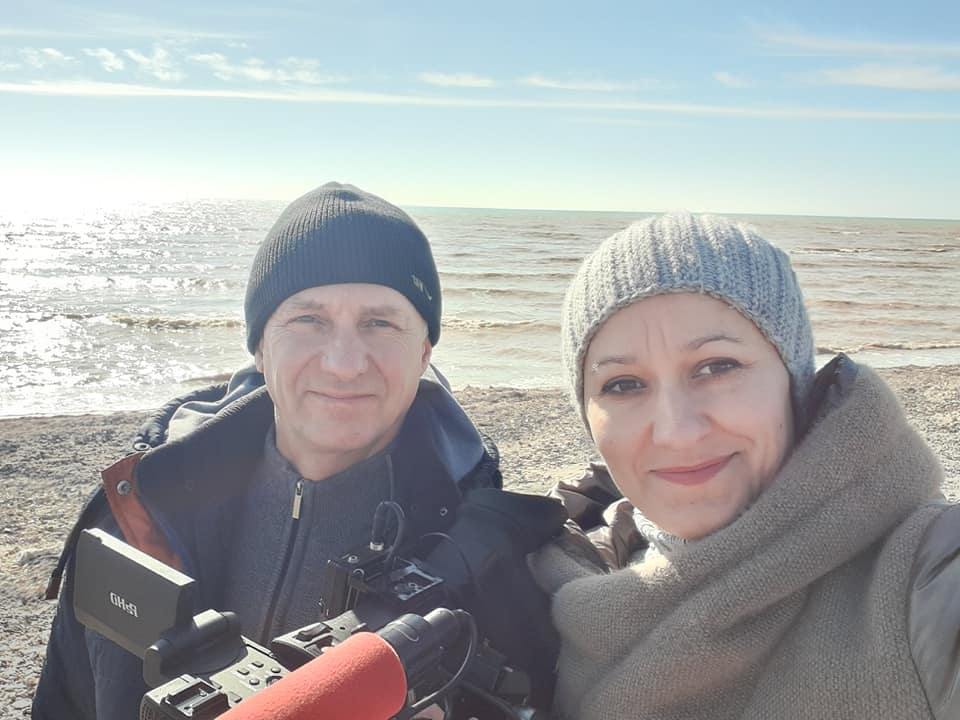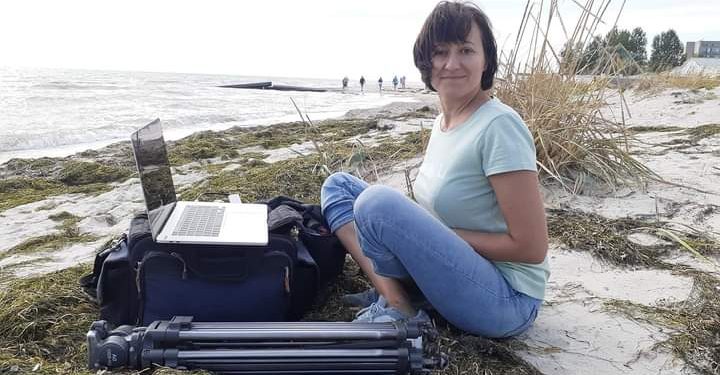Olena Vanina has been working as a correspondent for the national television channel “1+1” in her hometown of Kherson for over 10 years. With the onset of the Russian invasion, she stayed at home and switched to an underground mode of work. She endured over three months of occupation. Eventually, she had to leave, crossing nearly 30 enemy checkpoints. Her story is shared specially for the NUJU.
Even in Kherson, which shares a border with Crimea, the impending major war wasn’t evident. Large-scale Ukrainian troop exercises near Kalanchak just a week and a half before the Russian invasion actually inspired hope and confidence. Olena witnessed these drills as a journalist.
– Everything looked very good; our forces trained excellently. President Zelensky even visited. The only thing that surprised me was the presence of a large number of foreign journalists. Half a bus of local and Ukrainian media, and three buses of foreigners. While filming these exercises, they asked the president what he would do in case of an attack. He vaguely replied, saying that our intelligence was also working, and it might happen, or it might not… A day before the war, on February 23, when a state of emergency had already been declared in Ukraine, leaders of the Kherson Regional State Administration (RSA) assured us during a briefing: everything is under control, we are ready to defend Kherson. And on February 24, there were no heads of the RSA, no deputies, and most local deputies had left the region.
On the 24th, Vanina’s workday began early in the morning: around 4 am, the editor of the morning broadcast called her from Kyiv. Olena remembered that call forever: “Lena, wake up, the war has started! You will be going on air soon.”
– I asked, ‘What do you mean, ‘war’? What kind of broadcast at 4 in the morning?’ – the journalist recalls. – A little later, I heard several explosions outside my window. It seemed like someone was detonating explosive devices. And I couldn’t believe that there was already shooting around Kherson… But I still can’t fully believe that Kherson Region has been destroyed, violated, and plundered.
– As a result, I went on air at around 7 am. There was no official information; there was no one to ask, so I simply reported what I saw. I also called villages near the administrative border with Crimea, asking what was happening there, collecting information bit by bit. Fighting was already underway in Chonhar on the peninsula, and there was no communication with it. But I managed to tell viewers something…
– In the following days, it became clear that we were absolutely unprepared for war. There was an order for the police, for the prosecutor’s office, for all law enforcement agencies to leave the region. And we, ordinary citizens, were left alone, with unarmed territorial defense. People were gripped by despair. When the occupiers entered the city, members of the territorial defense and activists began throwing Molotov cocktails at Russian armored vehicles. People tried to defend their city with all their might, but the Russians shot them down immediately. Buzkove Park was covered in bodies. It was such a tragedy… The occupiers calmly entered the city and started settling there.
Smartphone as a Weapon
In the first days of the occupation, Olena Vanina could still go on the air several times a day. Moving around Kherson and the region became dangerous. So, she collected videos from eyewitnesses on social media and called everyone she could. Initially, press services were not functioning, and later, obtaining official information was very difficult because communication was lost where battles were taking place. Kherson was filled with Russians. However, the thought of leaving the city never crossed Olena’s mind, despite having her three children nearby. “Who else will tell people about such events if not a journalist?” According to Olena, all her Kherson colleagues, whom she knew well, did the same, especially the TV reporters – they stayed until the very end. But the idea of making materials with a camera and microphone openly no longer crossed her mind. So, they simplified filming to the level of an average user.
– Here’s my phone that captured all the historical shots that aired on ‘TSN’[Television News Service], – Olena demonstrates her smartphone in a colorful case. – It’s simple, ordinary, but it worked, it recorded. I tried not to draw attention to myself. When someone I knew asked if I was working, I would reply, ‘No, I’m not working now, how can I work at a time like this?‘
During the occupation, Kherson reports still aired on TV. To protect the actual author, Ternopil correspondents were assigned to narrate and edit the pieces, using their names as authors. Olena Vanina also incorporated numerous shots from the internet. Copyright and source crediting, once strictly followed, now took a back seat. She prioritized the safety of her subjects, understanding when volunteers or medics declined to discuss their activities.
During pro-Ukrainian rallies, Olena filmed participants from angles that didn’t reveal their faces in detail, emphasizing their backs. She also carefully selected the story topics, avoiding close-ups of checkpoints and Russian military personnel. Instead, the reports typically highlighted local residents’ struggles, covering issues like food prices, healthcare, communication, and public services.
– I underestimated the risks of my work during the occupation, – Olena reflects afterward. – But I really wanted to work. I wanted people not to forget about Kherson, to hear about Kherson. After all, an extremely difficult period began in the blockaded city, when people started saying, ‘Everyone has forgotten about us, everyone has abandoned us.’ And even seemingly small pieces about Kherson on national television – about people disappearing, about prices in the market, about blue and yellow ribbons on trees – were very important on air! So that everyone would know that Kherson exists, Kherson is fighting, Kherson is surviving.
“It was very scary when the occupiers went to people’s apartments. It reminded me of Stalin’s times.”
The Russians detaining and kidnapping people in the occupied city was a horrifying moral ordeal. It unfolded before their neighbors, who were powerless to assist. They understood that there would be no help if they, too, were taken. Olena’s apartment was also visited by them, but she later discovered that they came not as journalists but as members of a housing cooperative. They repeatedly rang her intercom and managed to access the building, knocking on her apartment door, which she chose not to open.
– That feeling when six armed people break into your home, and you can’t do anything, it’s very frightening, – Vanina recalls. – In that moment, I received a lifelong vaccination against the ‘Russian world.’ My children were very scared, and it’s unclear how it would have ended if I had opened the door. Neighbors were also frightened; everyone thought they had come for them because everyone had some important work. And when one of them couldn’t take it anymore and did open the door, the occupiers began interrogating him, asking who lived in these apartments, where they worked… Fortunately, the man managed to bluff, saying he had recently moved there and didn’t know anyone.
Sometimes, you would stand on the street and see a car stop, six armed people get out, some uncle with a list – and they would go into someone’s building. Like the “black raven” in Stalin’s times. Very scary… You see this happening and you can’t help in any way. So many people in Kherson and the region disappeared like this, and nothing is known about them to this day!
They managed to leave. “All it took” was two days and three thousand UAH.
After three months of occupation, the family decided to leave the city. Primarily because their eldest daughter had finished school and needed to take the Unified State Exam (ZNO) and continue her education, which was impossible on the occupied territory. Additionally, banks had virtually stopped operating, people had great difficulty withdrawing cash from their cards, shops and pharmacies closed, and then communication and the internet were disconnected. But leaving Kherson in the summer of 2022 had turned into an extremely risky affair. There were no “green corridors”; people were leaving at their own risk and peril. Civilians came under fire on the way, lost their lives, or were injured. There were long lines for volunteer buses in Kherson. People were coordinated through the “Leaving Kherson” group on Telegram. In this and other chat groups, those who had already left shared their experiences.

Photo by Oleksandr Andryushchenko.
Olena’s family, including herself, her husband, and their three children, made their way out using their own car. Therefore, they only had to pay for Russian-made gasoline. It was brought to Kherson in large containers and sold at improvised gas stations. The cost of fuel for the journey through the occupied territory amounted to two to three thousand UAH.
However, the biggest challenge was the journey itself to free Zaporizhzhia. On the road, hundreds of cars and buses would accumulate, and the occupiers would delay them with their checks. Olena witnessed firsthand how passengers on this transport suffered from 40-degree heat, tried to sleep sitting down because the journey took several days or even a week. On both sides of the road, they saw destroyed, abandoned estates, fires, smoke… A horrifying sight.
The fact that they managed to cover a distance of about 350 kilometers in just two days with only one overnight stay, Olena considers fortunate. On their way to Zaporizhzhia, they crossed over 30 occupant checkpoints and did not attract much attention.
– We stayed overnight in the village of Skelky (near the town of Vasylivka in Zaporizhzhia region), – Vanina recalls. – That area was also occupied. The locals who took us in were living without money, without communication, without work, but they let travelers in, offered food, a place to wash up, and a place to spend the night. These people in Zaporizhzhia were wonderful. A big thank you to them!
“Leaving journalism is now impossible”
After arriving in the free territory, the family stayed in the Kyiv region for a while. However, due to prolonged power outages lasting half a day, Olena had to take her children abroad for the winter, as it became impossible to study and work under such conditions.
Despite journalists’ incomes halving during the war and the increased danger involved, Olena chose to continue in the profession. She had considered leaving journalism before the war.
– Now I cannot do that because I have to document and tell everything that needs to be told, – Olena says. My colleagues are still working because it’s crucial to document these historic events. During the occupation of Kherson, we established a segment in our telethon called ‘Kherson Speaks.’ I invited guests from Kherson, and together with TV hosts, we interviewed them about life in the occupied city. Many guests had to conceal their identities and alter their voices due to the risks involved. I believe we will now have more courageous individuals who can speak openly.

– What kept me going throughout the entire occupation of Kherson? It was a relentless belief in victory. There was no other option in my mind. We all hoped for liberation, initially within a few weeks, then within a few months. When I left the city, I packed light jackets, expecting to return in September. However, things quieted down, and Kherson went silent. Approximately a third of the residents chose to stay, for various reasons – some refused to leave, others had sick family members. These were incredibly courageous people. When our military liberated Kherson in November, these residents welcomed them with joy. Those who had left earlier regretted not being there. But this victory is, above all, a celebration for those who waited, enduring life without electricity, gas, water, or communication. Now, they can finally breathe freely.
We will endure everything, as long as it’s without violence. The most important thing is that we are free, yes! — concludes Olena Vanina.
This series, titled Executed Free Speech, is created as part of a project Drawing Ukrainian And International Audience’s Attention To Serious Violations Of Human Rights And Crimes Against Journalists And Mass Media By The Russian Federation, which is performed by the National Union of Journalists of Ukraine, with support from the Swedish non-profit organization Civil Rights Defenders.
JOURNALISTS ARE IMPORTANT. Stories of Life and Work in Conditions of War is a cycle of materials prepared by the team of the NUJU with the support of the Swedish human rights organization Civil Rights Defenders.
#CRD

 THE NATIONAL UNION OF
JOURNALISTS OF UKRAINE
THE NATIONAL UNION OF
JOURNALISTS OF UKRAINE
















Discussion about this post